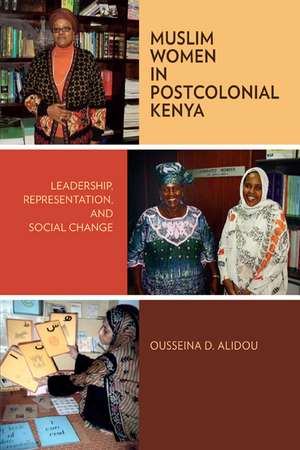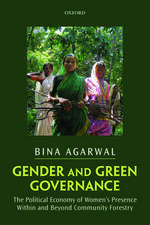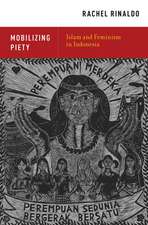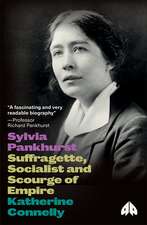Muslim Women in Postcolonial Kenya: Leadership, Representation, and Social Change: Women in Africa and the Diaspora
Autor Ousseina D. Alidouen Limba Engleză Paperback – 11 noi 2013
Mwalim Azara Mudira opened a school of theology for Muslim women. Nazlin Omar Rajput of The Nur magazine was a pioneer in reporting on HIV/AIDS in the Muslim community. Amina Abubakar, host of a women's radio show, has publicly addressed the sensitive subject of sexual crimes against Muslim women. Two women who are members of parliament are creating new socioeconomic and political opportunities for girls and women, within a framework that still embraces traditional values of marriage and motherhood.
Examining the interplay of gender, agency, and autonomy, Ousseina D. Alidou shows how these Muslim women have effected change in the home, the school, the mosque, the media, and more—and she illuminates their determination as actors to challenge the oppressive influences of male-dominated power structures. In looking at differences as opportunities rather than obstacles, these women reflect a new sensibility among Muslim women and an effort to redefine the meaning of women's citizenship within their own community of faith and within the nation.
Din seria Women in Africa and the Diaspora
-
 Preț: 270.56 lei
Preț: 270.56 lei -
 Preț: 209.30 lei
Preț: 209.30 lei -
 Preț: 163.65 lei
Preț: 163.65 lei -
 Preț: 205.65 lei
Preț: 205.65 lei -
 Preț: 432.86 lei
Preț: 432.86 lei -
 Preț: 232.29 lei
Preț: 232.29 lei - 23%
 Preț: 478.76 lei
Preț: 478.76 lei -
 Preț: 235.78 lei
Preț: 235.78 lei -
 Preț: 223.77 lei
Preț: 223.77 lei -
 Preț: 208.49 lei
Preț: 208.49 lei - 23%
 Preț: 473.13 lei
Preț: 473.13 lei - 23%
 Preț: 477.99 lei
Preț: 477.99 lei - 23%
 Preț: 476.36 lei
Preț: 476.36 lei - 14%
 Preț: 185.36 lei
Preț: 185.36 lei - 21%
 Preț: 378.04 lei
Preț: 378.04 lei -
 Preț: 182.07 lei
Preț: 182.07 lei -
 Preț: 230.50 lei
Preț: 230.50 lei -
 Preț: 199.67 lei
Preț: 199.67 lei
Preț: 232.09 lei
Nou
Puncte Express: 348
Preț estimativ în valută:
44.41€ • 47.49$ • 37.03£
44.41€ • 47.49$ • 37.03£
Carte tipărită la comandă
Livrare economică 17 aprilie-01 mai
Preluare comenzi: 021 569.72.76
Specificații
ISBN-13: 9780299294649
ISBN-10: 0299294641
Pagini: 248
Ilustrații: 41 b-w illus., 6 tables
Dimensiuni: 152 x 229 x 20 mm
Greutate: 0.34 kg
Ediția:1
Editura: University of Wisconsin Press
Colecția University of Wisconsin Press
Seria Women in Africa and the Diaspora
ISBN-10: 0299294641
Pagini: 248
Ilustrații: 41 b-w illus., 6 tables
Dimensiuni: 152 x 229 x 20 mm
Greutate: 0.34 kg
Ediția:1
Editura: University of Wisconsin Press
Colecția University of Wisconsin Press
Seria Women in Africa and the Diaspora
Recenzii
"Alidou introduces readers to extraordinary Kenyan Muslim women who deftly weave together secular, religious, and activist perspectives to transform their communities. Their stories, and Alidou's astute analysis, portray the challenges facing twenty-first-century agents of change."—Susan Hirsch, author of Pronouncing and Persevering: Gender and the Discourses of Disputing in an African Islamic Court
“A brilliant work fashioned from the lived experiences and critical reflections of Muslim women as transformative leaders negotiating the secular and religious in their public and private lives. Brimming with insights for our polarized nations in turbulent times, this is a must-read book for anyone concerned with Kenya, Africa as a whole, and Muslim societies beyond.”—Margot Badran, author of Gender and Islam in Africa
“With rich ethnographic data, Ousseina Alidou has written another excellent and highly readable book, highlighting the creative agency of the multifaceted and multiracial community of Kenyan Muslim women.”—Shahla Haeri, author of No Shame for the Sun: Lives of Professional Pakistani Women
Notă biografică
Ousseina D. Alidou is the Director of the Center for African Studies at Rutgers University–New Brunswick and an associate professor in the department of African, Middle Eastern, and South Asian Languages and Literatures. She is the author and editor of many books, including Engaging Modernity: Muslim Women and the Politics of Agency in Postcolonial Niger and Post-Conflict Reconstruction in Africa.
Cuprins
List of Illustrations
Acknowledgments
Introduction
Preliminary Remarks
Muslim Women in Kenya: A Sketch
Methodology
Outline of the Book
Chapter 1: Bi Swafiya Muhashamy-Said: A Pioneer in Reforming Chuo (Madrasa) Nursery Curriculum in Kenya and Beyond
Introduction
The Colonial Beginning: A Historical Background to Muslim Education
Postcolonial Developments: Muslim Education
The New Vision: Modern Integrated Madrasa Nursery Curriculum
Conclusion
Chapter 2: The Ma'had Tradition of Mwalim Azara Mudira
Introduction
Creating a Women's Space for Islamic Teaching and Learning in Kenya
Muslim Women Educators: A Background
The Making of Mwalimu Azara Mudira and the Founding of Ma'had
Conclusion: The Impact of Islamic Reformist Women
Chapter 3: Muslim Women Members of Parliament: A Minority within a "Tribe" of Women
Women and Representative Politics: A Brief Overview
Muslim Women MPs: A Minority within a "Tribe" of Women
Muslim Women Parliamentarians Confronting Adversity within Muslim Communities
Unmarried Young Muslim Women in Parliament
How Muslim Women MPs Transform Parliament and Schools
Dress Politics in Parliament: Inscribing Kenyan Muslim Diversity
Achieving Success within Their Constituencies
Public Health Education: The HIV Pandemic and Community Sensitization
Conclusion
Chapter 4: Judge Abida Ali Aroni, First Muslim Woman Justice of the Kenya High Court
Introduction
Muslim Women's Rights Activist of Mixed Heritage within Kenyan Ethnic Politics
Lessons from the Muslim Women Sisters Network
Secular Accommodation of the Kadhi Courts
Bargaining with Patriarchy
Gender and the Dialectics of Religious and Secular Literacy
Building with Progressive Muslim Male Lawyers and Other Women's Rights Advocates
Conclusion
Chapter 5: Muslim Women, Rights Discourse, and the Media as a Political and Activist Platform
Introduction
The Nur Magazine: Islam, HIV/AIDS, Sexuality, and Women's Rights
Ukumbi Wa Mamama: Islamist Radio Talk Show, Muslim Women's Political Activism
Conclusion
Conclusion: Kenya Muslim Women's Rights Activism and Social and Political Change
Notes
References
IndexDescriere
In education, journalism, legislative politics, social justice, health, law, and other arenas, Muslim women across Kenya are emerging as leaders in local, national, and international contexts, advancing reforms through their activism. Muslim Women in Postcolonial Kenya draws on extensive interviews with six such women, revealing how their religious and moral beliefs shape reform movements that bridge ethnic divides and foster alliances in service of creating a just, multicultural, multiethnic, and multireligious democratic citizenship.
Mwalim Azara Mudira opened a school of theology for Muslim women. Nazlin Omar Rajput of The Nur magazine was a pioneer in reporting on HIV/AIDS in the Muslim community. Amina Abubakar, host of a women's radio show, has publicly addressed the sensitive subject of sexual crimes against Muslim women. Two women who are members of parliament are creating new socioeconomic and political opportunities for girls and women, within a framework that still embraces traditional values of marriage and motherhood.
Examining the interplay of gender, agency, and autonomy, Ousseina D. Alidou shows how these Muslim women have effected change in the home, the school, the mosque, the media, and more—and she illuminates their determination as actors to challenge the oppressive influences of male-dominated power structures. In looking at differences as opportunities rather than obstacles, these women reflect a new sensibility among Muslim women and an effort to redefine the meaning of women's citizenship within their own community of faith and within the nation.











